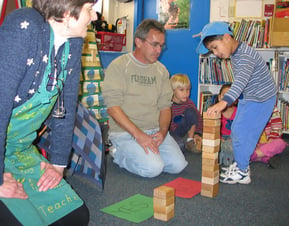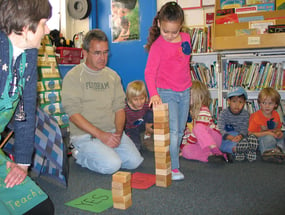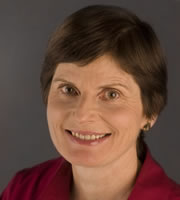By Marie Faust Evitt
One of my big discoveries as a preschool teacher was seeing how much children enjoy science. They love pouring water, mixing paint colors, rolling balls down ramps and watching wiggling earthworms. All the while, they are looking closely, asking questions and trying out ideas. “What will happen if I pour this big container of water into this tiny container?” They are scientists.
One way to deepen children’s thinking is to ask before and while they are exploring, “What do you think will happen?” Children, however, are often reluctant to make predictions. They don’t want to say what they think because they want to be right; they don’t want to be wrong.
Here is one way I help children get comfortable making predictions--we predict the weather for the day at school.
- At group time, I ask my preschoolers what the weather is right now.
- Then I say, “We are going to become scientists who study the weather. We are going to become meteorologists.” I say the big word slowly, and we clap once for each syllable.
- I say, “We can be meteorologists and make a prediction about whether it will rain. A prediction is something that you think will happen based on what you already know.” I ask, “Do you think it will rain by the end of school?” We talk about the signs that might show it would rain such as clouds and wind.
- I tell them that meteorologists are not always right and that it is okay if events turn out differently than what they predicted. It is expected, and part of doing science, for scientists’ predictions to be wrong.
- I place a green YES sign and a red NO sign on the floor. I invite children to place a wooden block on the YES pile if they think it will rain or a block on the NO pile if they think it won’t rain by the end of school.
- To help children feel comfortable with their predictions, I place a block on the least likely outcome. On a bright sunny day, I’ll put my block in the YES it will rain pile.
- We count the stacks and talk about which stack has more blocks.
- We check the results at the end of the day.


Photos Courtesy of Marie Faust Evitt
Teacher Marie’s predictions rarely happen, and I say, “Weather is not always easy to predict, even for the scientists who study weather. We can try again another day.” Children also learn that many things are not a clear yes or no. One day, we had a few drops of rain during class, and then the rain stopped. Did that mean that yes, it rained? A great debate ensued.
This simple weather prediction activity connects the science of weather, the vocabulary words meteorologist and prediction and the math skills of counting and comparing amounts. I also read books about weather, such as Like a Hundred Drums by Annette Griessman, to enhance literacy, and I invite children to draw pictures and dictate stories about what they like to do on a rainy day.
For more classroom-tested explorations that engage children and build skills throughout the curriculum, check out my book Thinking BIG, Learning BIG: Connecting Science, Math, Literacy and Language in Early Childhood.
Have fun making predictions with your young scientists!

This post was contributed by Marie Faust Evitt. Marie is the head teacher of a preschool class for four- and five-year-olds. Prior to teaching, Marie was an award-winning newspaper reporter and freelance journalist for more than 20 years. Her articles and essays on education, parenting, and child psychology have been published in Newsweek, Parents, Child, Parenting, Scholastic’s Parent & Child, Scholastic.com, and Family Fun. She lives in Mountain View, California.
Author(s)Marie Faust Evitt
Ashleigh Craven
Ashleigh Craven has a decade and a half of diverse category experience from agency communications to athletic apparel to automotive to education, developing and executing communication strategies in both traditional and social media. She has supported national product launches and corporate events for the likes of Soffe, Buick, Chevrolet, Wake Forest University , Kaplan, and others. She has an BA from the University of Michigan in English and Communication Studies and an MA from Wake Forest University, where she focused her studies on argumentation and presidential rhetoric and speechwriting. She served as director of marketing for Gryphon House from 2017- 2020.



